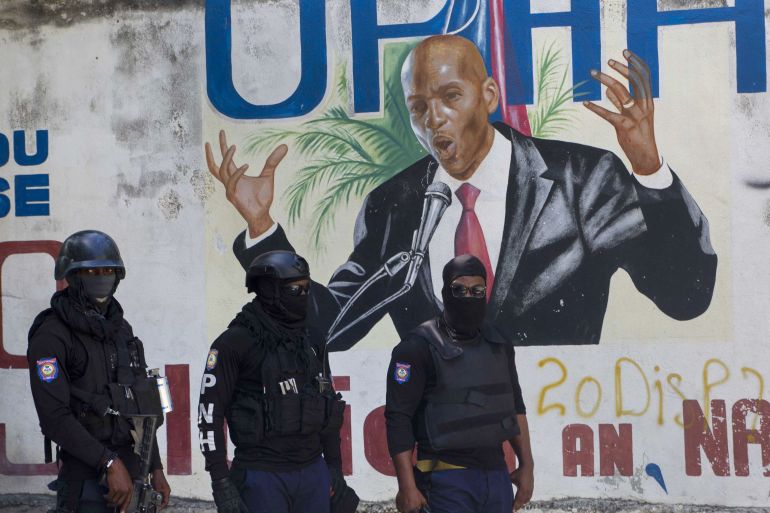Colombia says consul in Haiti threatened after Moise killing
Foreign minister says threats occurred after consul tried to give aid to detained former soldiers.

Colombia says its consul in Haiti has received threats after trying to provide aid to 18 former Colombian soldiers arrested as part of an investigation into the assassination of Haitian President Jovenel Moise last year.
Foreign Minister Marta Lucia Ramirez said on Tuesday the threats were aimed at Julio Cesar Santa Martinez, who serves as Colombia’s sole representative in Haiti, where Bogota does not have an embassy.
Keep reading
list of 3 items‘No way out’: Haitian asylum seekers reel in southern Mexico
US aid group details ‘miraculous’ missionary escape in Haiti
She did not provide further details on the nature of the threats or who made them, but said they occurred as the consul sought to provide humanitarian assistance to the ex-soldiers who were among the dozens of suspects arrested in a wide-ranging probe into the killing of Moise in his home in July 2021.
The assassination cast Haiti, one of the poorest countries in the world, into further political and economic chaos, which had recently been compounded by several natural disasters.
Haitian officials have maintained the killing was carried out by a group that included former Colombian soldiers working for a private security firm.
No one so far detained in the killing has been formally charged in Haiti, however, United States authorities in early January arrested 43-year-old Colombian Mario Antonio Palacios.
He was charged with “conspiracy to commit murder or kidnapping outside the US” and “providing material support resulting in death, knowing or intending that such material support would be used to prepare for or carry out the conspiracy to kill or kidnap”.
The US Justice Department has said Palacios and the other intruders had initially sought to kidnap Moise, but killed him in the process.
Following the arrest, Claude Joseph, who briefly served as Haiti’s acting president following Moise’s murder, called on US and Haitian authorities to swiftly extradite Palacios to Haiti.
The Colombian government, meanwhile, has offered to help Haitian authorities investigate the killing, but has complained that the former soldiers have been mistreated in Haitian prisons.
Colombia’s foreign ministry said last year the consul visited the detained ex-soldiers several times to check on their health and has also provided them with toiletries and other items sent by their relatives in Colombia.
In August, Ramirez, the foreign minister, sent a letter urging the International Red Cross to visit the prisoners and document their condition.
She said two of the former soldiers had been tortured and that none had been provided with lawyers.